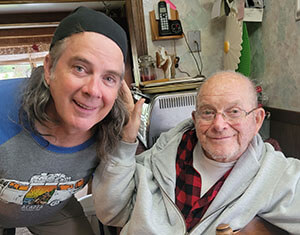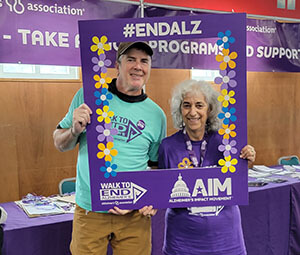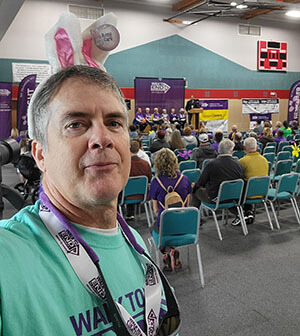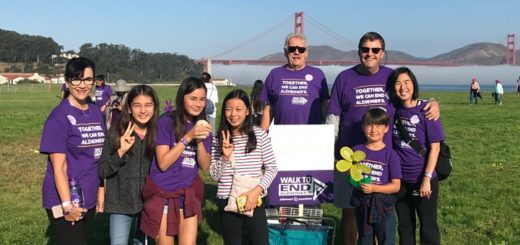Humboldt County resident finds support through volunteering
For volunteer week we are highlighting one of our Walk to End Alzheimer’s® Committee Members. Mark Goldhawk has been giving back to various organizations his whole life. Last year, he started donating his time to the Alzheimer’s Association®. Mark, whose father is currently living with Alzheimer’s, uses volunteering as a way to learn more about the disease and help others in similar situations. He hopes that by starting a conversation it will help people feel more comfortable talking about their experiences.
Sara the hero
Mark and his five siblings grew up in New York. Their father was and still is fun loving, upbeat and known for his acts of kindness. Mark’s parents encouraged their kids to go to college, which they all did.
Eventually, Mark left his East Coast home and moved west to California. He started his marriage and family therapist career by volunteering with the Gay and Lesbian Outreach to Elders (GLOE), an organization in San Francisco for LGBTQ+ seniors. This led to a lifelong career in counseling and eventually took him north to Humboldt County where he currently lives.
Within the last decade or so, Mark’s mom got sick and one of Mark’s sisters, Sara, moved home to care for their mother. In 2016 their father was diagnosed with Alzheimer’s. “Sara is absolutely amazing,” said Mark. “She doesn’t appreciate it when people say, ‘That must be so hard.’ [Sara wants to reply,] ‘Please stop doing that, I’m enjoying it, and it’s meaningful.’ Sara is the hero of the family.”
Sadly, Mark’s mom passed away a few years ago, leaving the full task of caring for their father on Sara and her siblings.
Support from family
While Sara is the primary caregiver for their father, Mark and his other sibling help as they are able. One sibling helps their dad shower and shave while another helps with the legal and financial aspects of their father’s care. Mark and another sister will occasionally go home and allow Sara time to step away from caregiving. Mark says, “It’s the best we can do and it’s working. Everyone talks and communicates, doesn’t argue or pick on each other.”
Because Mark lives the furthest from his family, he is unable to come and visit as often as his other siblings. Instead, he provides support to Sara by letting her call him to talk about their father as often as she’d like. “My role is to talk with her every week,” said Mark. “It can be every other day or sometimes days in a row. I’m pretty good about doing things over the phone. [We talk about] his medication, and the last meeting with his doctor, and small daily problems and miracles. Sometimes I talk with our dad, it helps both a little bit.”
Finding the Alzheimer’s Association
Early last year, Mark was volunteering at an organization where he ran into a Walk to End Alzheimer’s Committee Member. They began chatting about the Walk in Humboldt County and it sounded like an organization he’d like to get involved with.
“I talked to her, and said, ‘You know I could probably lend a hand with this,’” said Mark. “I’m retired, my father has Alzheimer’s and I’d like to learn as I go. I know it’s really important and that’s how I got started.”
Mark was pleasantly surprised to see how welcoming the committee was when he joined. “When I said I’d like to be part of this [the Walk Committee] just opened their arms immediately. I go to all the meetings. When you fear something face it directly, learn about it.”
Raising funds
Currently Mark is a member of the 2023 Walk Committee, helping to plan the Humboldt County Walk. He helps wherever he is needed which for him, also includes a little fundraising. When a restaurant offers to donate a portion of the proceeds, you may find Mark there talking to people about the disease and telling them about services the Alzheimer’s Association has to offer.
“I’ve been involved in fundraising and I love it,” said Mark. “I think it’s a fantastic way to be with people. You don’t have to be amazing you just have to be good at it. I have a direct personal understanding of Alzheimer’s. It’s something I think about for myself.”
Talking about the disease
Mark reminds other caregivers that talking to your family members about the disease can actually be helpful. “It’s important to talk about the things that are important,” said Mark. “Even though they may not be able to articulate what they hear, [a person living with the disease] can hear you and feel you.
“Sometimes there’s wonderful things you can do to support your family member, it requires you to let go of anger, frustration and help them talk about things from their past. It’s great as a volunteer when people ask questions and talk about family members. I ask them to tell me a story about them, what’s a great memory you have about them?
“We can eradicate that fear of engaging with people who have this disease. You can be easily affected, and you can still be effective. Volunteering a good opportunity to do that.”
LGBTQ+ community and dementia
Research shows that those who have a parent or sibling with Alzheimer’s are more likely to develop the disease than those who do not have a first-degree relative with Alzheimer’s. This is especially true for Mark, who has both a father and a grandfather who were diagnosed with Alzheimer’s.
Because of his family risk, Mark is aware he could one day get Alzheimer’s. Additionally, Mark is a member of the LGBTQ+ community. This community may face particular challenges related to Alzheimer’s and dementia. These include finding inclusive and welcoming health care providers, less ability to call upon adult children for assistance, concerns about stigma and higher rates of poverty and social isolation.
According to the Alzheimer’s Association and SAGE Issues Brief; LGBT and Dementia, 7.4% of the lesbian gay and bisexual older adult population is living with dementia. Forty percent report that their support networks have become smaller over time and, like Mark, 34% live alone.
Luckily, Mark isn’t worried about his support system. He has a strong friend group that he meets with weekly. “Many of them have lost spouses or are getting Alzheimer’s,” said Mark. “I lend them an ear. I do family style dinners with people every Sunday.
“I have different support systems. I have resources, and my pension will support me. I make healthy food and I stay connected. [Even during COVID my friends and I] would just meet. It made a huge difference.”
Finding support through volunteering
With his background in counseling, Mark understands the importance for support groups. However, he didn’t feel like a support group was the right fit for him. Instead, Mark found his support group amongst his fellow volunteers.
“Volunteering is an amazing life experience, you get more than you put in,” said Mark. “You’ll get support like crazy and the Association is organized about that. We can learn to be supportive even in the face of the slow and impending loss we all have to deal with.
“It’s a great way to understand and to be supported. When you’re in a volunteer organization you’re going to get the best support you’ve ever had. You learn about the disease and get access to articles. I think it is a fantastic way to give and receive support. It’s a two-way street and it’s wonderful.”
For more information on how to become an Alzheimer’s Association volunteer visit alz.org/norcal/volunteer for a full list of opportunities in our chapter.
Walk to End Alzheimer’s – Humboldt County will be held on October 14 at the Adorni Center in Eureka. Sign up today to start your team.
Learn more:




















